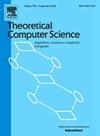Opinion maximization in social networks via link recommendation
IF 0.9
4区 计算机科学
Q3 COMPUTER SCIENCE, THEORY & METHODS
引用次数: 0
Abstract
We study a variation of the Friedkin-Johnsen model for opinion dynamics in a leader-follower social network with n nodes and m edges, where the node set is partitioned into three subsets: set of leader nodes with opinion 1, set of leaders with opinion 0, and set of follower nodes. We give an explicit expression for the steady-state opinion vector in terms of some related matrices and the initial opinion vector, and interpret the equilibrium opinion vector as the weighted average of the initial opinions for all nodes with the weights being the escape probabilities of a defining random walk. We then pose an opinion maximization problem of recommending k new edges between 1-leader and follower nodes so that the equilibrium overall opinion is maximized. We show that the objective function is monotone and submodular, and propose a simple greedy algorithm with an approximation factor that approximately solves the problem in cubic running time. To speed up the computation, we also provide a fast algorithm with an approximation ratio and computation complexity for any , where the notation suppresses the factors. Extensive experiments on both real social networks with real opinions and datasets with synthetic opinions demonstrate that our algorithms are effective, efficient, and scale well to large social networks.
求助全文
约1分钟内获得全文
求助全文
来源期刊

Theoretical Computer Science
工程技术-计算机:理论方法
CiteScore
2.60
自引率
18.20%
发文量
471
审稿时长
12.6 months
期刊介绍:
Theoretical Computer Science is mathematical and abstract in spirit, but it derives its motivation from practical and everyday computation. Its aim is to understand the nature of computation and, as a consequence of this understanding, provide more efficient methodologies. All papers introducing or studying mathematical, logic and formal concepts and methods are welcome, provided that their motivation is clearly drawn from the field of computing.
 求助内容:
求助内容: 应助结果提醒方式:
应助结果提醒方式:


